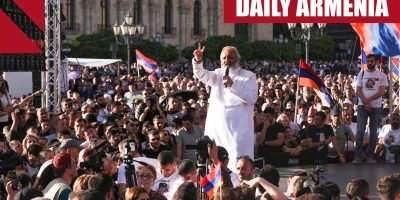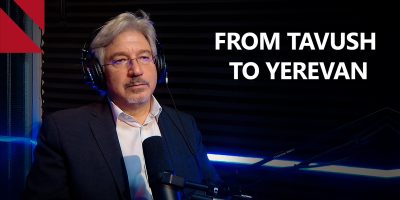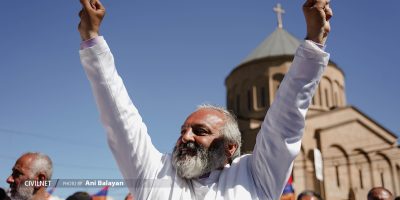Azerbaijan is facing international criticism for human rights violations as it prepares to host the first ever European Olympics in Baku from June 12 to 28.
The inaugural event, endorsed by the International Olympic Committee and organized by the European Olympic Committees, will feature 6,000 athletes from 50 countries competing in 20 sports.
“No-one should be fooled by the glitz and glamour of the international show Azerbaijan is putting on to portray a squeaky-clean international reputation and attract foreign business,” said John Dalhuisen, Amnesty International’s Director for Europe and Central Asia. “Its authorities are among the most repressive in Europe and would certainly be on the medal winning podium if prizes were on offer for the number of activists and rights defenders behind bars,” he added.
Amnesty International released a report on March 4, 100 days before the opening ceremony in Baku, highlighting the human rights violations related to arbitrary arrests and detentions taking place in Azerbaijan.
According to Amnesty International’s findings in the report, titled “Guilty of Defending Rights: Azerbaijan’s Human Rights Defenders and Activists Behind Bars,” more than 90 instances of harassment, intimidation, arbitrary arrests and politically motivated charges compiled by journalists, bloggers, activists, and human rights defenders occurred in the country.
Among those arrested is Leyla Yunus, a prominent human rights defender, who was arrested on July 30, 2014 along with her husband Arif Yunus. They remain in prison until today awaiting trial. Just a few days before her arrest, Yunus had organized a press conference in which she called for the international boycott for the European Games in Baku because of the Azerbaijani regime’s dire human rights record.
Other arrests include Rasul Jafarov, who had also planned to use the Games as a campaign for democracy and drawing attention to human rights abuses in Azerbaijan, and Intigam Aliyev, a prominent human rights lawyer.
Khadija Ismayilova, an award winning Azerbaijani investigative journalist, and a vocal critic of the Aliyev regime, was arrested on December 5, 2014.
Amnesty estimates there are at least 20 prisoners of conscience in Azerbaijan.
The Sport and Rights Alliance (SRA) is a coalition including Human Rights Watch, Amnesty International, Football Supporters Europe, Supporters Direct Europe, FIFPro-World Players’ Union, Terre des Hommes, and Transparency International Germany. SRA aims to ensure that the host countries of mega-sporting events respect human rights, the environment, and anti-corruption requirements at all stages of the process.
In a letter addressed to Patrick Hickey, the president of the European Olympic Committees (EOC), the SRA urged the Committees to speak out against the escalation of Azerbaijan’s repression of freedoms and the deterioration of its human rights record. Media freedom, freedom of expression and respect for other fundamental human rights are all key principles of the Olympic Charter that the European Games are meant to uphold.
“One of the European Olympic Committees’ chief aims is spreading Olympic ideals. Unless action is taken soon to address these abuses and free unjustly imprisoned critics, Azerbaijan will be setting a terrible precedent as the first host of the European Games,” the letter said.
The letter calls on the Azerbaijani government to immediately and unconditionally free all unjustly imprisoned journalists and human rights activists, to end the harassment, intimidation and arbitrary detention and politically-motivated prosecutions, and finally to refrain from the arbitrary denial of state registration to human rights and pro-democracy NGOs.
Other international criticisms revolve around Azerbaijan’s intentions behind the Games. Human rights group “Index on Censorship” accused President Ilham Aliyev of using the games to “whitewash” the country’s reputation in the midst of human rights violations and a crackdown on freedom of speech.
In an opinion piece on Azerbaijan’s free and alternative media outlet Meydan TV, Mike Runey wrote: “Other than blind hubris, the only plausible explanation for the Azerbaijani government’s enthusiasm for the games is that they represent a golden opportunity to produce an illusion of international prestige and wealth for the benefit of a domestic audience.”
He went on to say that this is not a new strategy for Azerbaijan, as “it fits squarely within a the Aliyev government’s longstanding practice of sending money abroad to burnish its image at home.”
For many years, Azerbaijan spent millions of dollars on lobbying firms in Washington, D.C. In 2013, Azerbaijan ranked as the 10th highest-spending foreign country for American lobbyists ($2,298,233.03), according to Meydan TV.
Aliyev’s government has invested a reported £6.5 billion ($9.82 billion) in sports venues and infrastructure, according to the Guardian. Aliyev, who is a keen advocate of the project, hopes that by organizing an international event at this scale, he will showcase the country as a wealthy, modern, and sophisticated place.
In a move to gloss over international criticism of human rights violations, the Azerbaijani organizers have decided to foot the bill for all 6,000 athletes.
The hashtag #RealBaku2015 has been popular on Twitter to highlight the realities of the Baku Games, below are some examples of what individuals and NGOs have said:
@rebecca_vincent lists political prisoners in Azerbaijan. Could be in 100s. The story behind ‘glitz and glam’ of the games’ #realbaku2015
— ARTICLE 19 Europe (@article19europe) April 28, 2015
From NGO laws to imprisonment, Azerbaijan took several steps to silence criticism says @Giorgi_Gogia #realbaku2015 — Melody Patry (@melodypatry) April 28, 2015
There is no one left who can safely do human rights activism in Azerbaijan @SportForRights .@article19 #RealBaku2015 — David Diaz-Jogeix (@DiazJogeix) April 28, 2015
#Azerbaijan sentences human rights lawyer to prison @indexcensorship https://t.co/A33jQYcBZf #realbaku2015 — Index on Censorship (@IndexCensorship) April 25, 2015
#Azerbaijan sentences activist ahead of European Games http://t.co/KsLO5yYQaD via @amnesty #IntigamAliyev #humanrights #realBaku2015 — AZPoliticalPrisoners (@humanrightsaz) April 22, 2015
#Azerbaijan among 10 Most Censored Countries,says new CPJ report.@SportForRights #realbaku2015 #Baku2015 @OSCE_RFoM https://t.co/GU6n5OvgOP — Nina Ognianova (@Kremlinologist1) April 21, 2015
#Azerbaijan: Release #activists, #journalists behind bars ahead of #BakuGames2015 via @hrw http://t.co/6JsUsi3JWj #HelloBaku #realbaku2015 — PENamerican (@PENamerican) April 21, 2015
Journalist is not allowed to go to the #PACE session. A criminal case has been filed against him. #RealBaku2015 http://t.co/FCdI5gtN2o — NiZΛMi ΛBDULLΛYEV (@NizamiHR) April 20, 2015
Sports journalists should report on what’s going on beyond the sports, on the ground. @Giorgi_Gogia #realbaku2015 — IPGA (@AZfreeXpression) April 28, 2015
After a decision by the Armenian National Olympic Committee’s (ANOC) executive committee on March 10, Armenia is set to participate in the games. It is expected to be represented in the sambo (martial art), shooting, judo, wrestling, boxing and taekwondo competitions.
Lori Baitarian

















